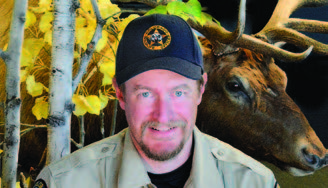
Aaron Berscheid is a district wildlife officer for Colorado Parks and Wildlife. Aaron covers the “wild” side of Northeast El Paso County, including Black Forest, Falcon, Peyton and Calhan. He also covers some of Elbert County, north of U.S. Highway 24 and south of State Highway 86, including the towns of Elbert, Kiowa, Ramah, Simla, Matheson and a small portion of the Limon area.
Baby animals are on the way
By Aaron Berscheid
District Wildlife Manager, CPW
With the weather warming up, new life is rushing into the wildlife world. The call I get most this time of year? “This baby animal needs your help!”
In the coming weeks and months, many animals will be giving birth to and raising their young ones. Most often, this goes smoothly and you won’t even notice it happening. However, every once in a while you might notice something that seems odd to us humans, even if it is not. So when should you leave an animal alone, and when should you jump in to call for help?
Let’s talk about the vast majority of encounters with wildlife. Every time you encounter a wild animal, no matter the size, your first instinct should be to leave it where it is and not approach it. There are countless normal and legitimate reasons why baby animals are on their own or adult animals seem injured. Some will even pretend to be injured to draw attention away from their babies.
A common call that CPW receives this time of year concern fledgling birds. Just like young humans struggle to take their first steps, birds take a bit of time and practice to learn to fly. Often, you will find birds on the ground that look “fluffy” and may be bouncing around on the ground, fluttering their wings but unable to get up in the air. If you look around, you will probably see adult birds of the same species keeping an eye on the fluffy ones from nearby. Mom or dad will often continue to feed them while they are on the ground
Most of the time, it will only be a matter of hours or days before they are flying on their own. The best thing you can do is leave them be and keep your pets away from them during this time. Enjoy the sight while you can because they will be off and flying before you know it. This same tip applies to owls and hawks, as well as common songbirds.
I often receive calls about baby squirrels, raccoons and bunnies that are alone. The same advice applies: Leave them be. Squirrels and raccoons will sometimes move their babies from one location to another and one can get lost along the way. Most of the time, the mothers will come back and get them once there are no humans around and they think it is safe. Touching or moving them reduces the chance the mothers will retrieve them. Baby bunnies mature very quickly and are generally on their own once they are sitting upright with their ears up, even when they can still fit in the palm of your hand.
If you see a deer fawn alone, it is very important that you do not intervene! Mothers will leave their fawns for long periods of time while they search for food so they can eat and be able to produce the milk they need to feed their young. Because the babies do not have a smell, moms do not hang around their fawns for too long so they don’t draw the attention of predators. Mother deer have been known to leave their fawns up to three days at a time!
The worst option for the fawn is a human who moves it from the location where the mom left it. The fawn can only thrive in the care of its mother, and human rehabilitation has very little long-term success. If you think a fawn has not been attended to in more than two days, please contact CPW and we will use our training to determine if the fawn is truly abandoned.
Another reason to keep your distance is that a mother deer will aggressively protect their fawns. This usually means they will attack your dogs, who they see as similar to coyotes, a natural predator that deer deal with in the wild. It is important to keep your dogs on a leash and under your physical control this time of year so your dogs do not get into an encounter with a momma deer or any other wildlife.
These are only a few of the encounters you may have this time of year, but there are a myriad of other wild things you might come across. If you do come across a wild animal that you believe needs help, our best advice is to not approach it, take a video from a distance and call your local CPW office at 719-227-5200. After hours or on the weekends you can call the Colorado State Patrol non-emergency line at 719-544-2424. CPW keeps wildlife officers on-call at all times to handle wildlife related emergencies…
In the coming months, I’ll share more stories as I write about wildlife issues in our community. Got a question, problem or column idea? Please email me at [email protected] or call me at 719-227-5231.
I might even answer your question in a future installment of “Wildlife Matters.”

